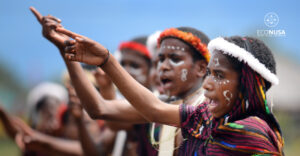
Local wisdom that is possessed by each ethnic group in Indonesia plays a major role in regulating social life. A set of rules is arranged to create a harmonious relationship between community members. When conflicts occur, local wisdom plays an important role to ensure the conflict ends without leaving further problems or even revenge on each person.
Long before modern society recognized material and formal law, the Moi people who inhabit around Sorong Regency, West Papua Province, have their own mechanisms for resolving various conflicts that occur between community members. Conflict resolution uses a set of sacred rituals that involve its community members.
The Moi people have a traditional ritual called “Teh Bless” to resolve various conflicts that occur in the community. For example, conflicts due to infidelity, theft, defamation, and others. If a conflict comes to pass, the traditional elders will hold a meeting with the related parties. This meeting will decide the conflict resolution mechanism. Such as, deciding location, time, and amount of fines payment which must be given to the winning party in “Teh Bless” ritual.
Yudha N. Yapsenang and Desy P. Usmany in the “Moi Ethnic Traditional Conflict Resolution Mechanism” published in the Archaeological Journal of Papua (2019), stated that the “Teh Bless” ritual can resolve almost all kinds of conflicts as well.
“This mechanism is sacred, so whoevers are guilty will definitely be caught even though they deny the accusation,” wrote Yudha and Desy in the journal.
Technically, “Teh Bless” takes place in the river which is agreed by related parties and the traditional elders. Usually, the river which is agreed has a water level as high as an adult’s calf. After the predetermined day for the ritual arrives, the disputing parties along with the traditional elders will head to the river.
Before the ritual begins, the traditional elders lead a prayer so that the implementation of Bless tea can run smoothly and the results can be accepted by all parties. The ritual begins with a command that comes up from the traditional elders. After that, representatives of the disputing parties will sink their heads into the river. Its ritual part is called “molo”. While immersing their heads into the river, their hands held onto a piece of wood. When doing “molo”, the immersed head should not be moved. The party that moves the head, either from side to side or upwards, will lose.
“Usually, representative people from the wrong party can not last long while doing “Teh Bless”. It often lasts less than 3 minutes. If they still force themselves to survive their head into the water, there is a big possibility that their nose will bleed or their temples will be injured, “Yudha and Desy wrote.
The losing party is obliged to pay fines according to the agreement that has been determined in the traditional consultation before the event. Typically, the items that are used to pay to the winning party were cloth, chintz, and other cultural items.
Interestingly, the implementation of “Teh Bless” was represented by other people who were not involved in the conflict, even they can be come from outside the village. Yudha and Desy found that these representatives were chosen not only from neighboring villages, but also from areas that were quite far from Moi’s residence, such as Raja Ampat.
Before the ritual is held, the traditional elders will ask about the probity of the hearts of those who represent it. If the person concerned has a grudge or a problem that has not been resolved, then that person may not participate in the event.
“Usually, people who do “Teh Bless” will be rewarded with a large reward,” wrote Yudha and Desy.
The implementation of “Teh Bless” attracted all community members’ the attention, from children to the elderly. The positions of both parties will be divided into two parts on the river bank, on the left and right side. So do people who watch the event also divided into two parts. When “Teh Bless” takes place, the river bank will be covered with a long cloth and guarded by traditional elders. This is intended to prevent new conflicts from those who are not satisfied with the “Teh Bless” results.
When this ritual was taking place, the community shared the role to prepare food to eat together after the event has been done; men are finding firewood, while women are in charge of cooking food from the garden and grilled sago in bamboo.
Editor: Nina Nuraisyiah & V. Arnila Wulandani




